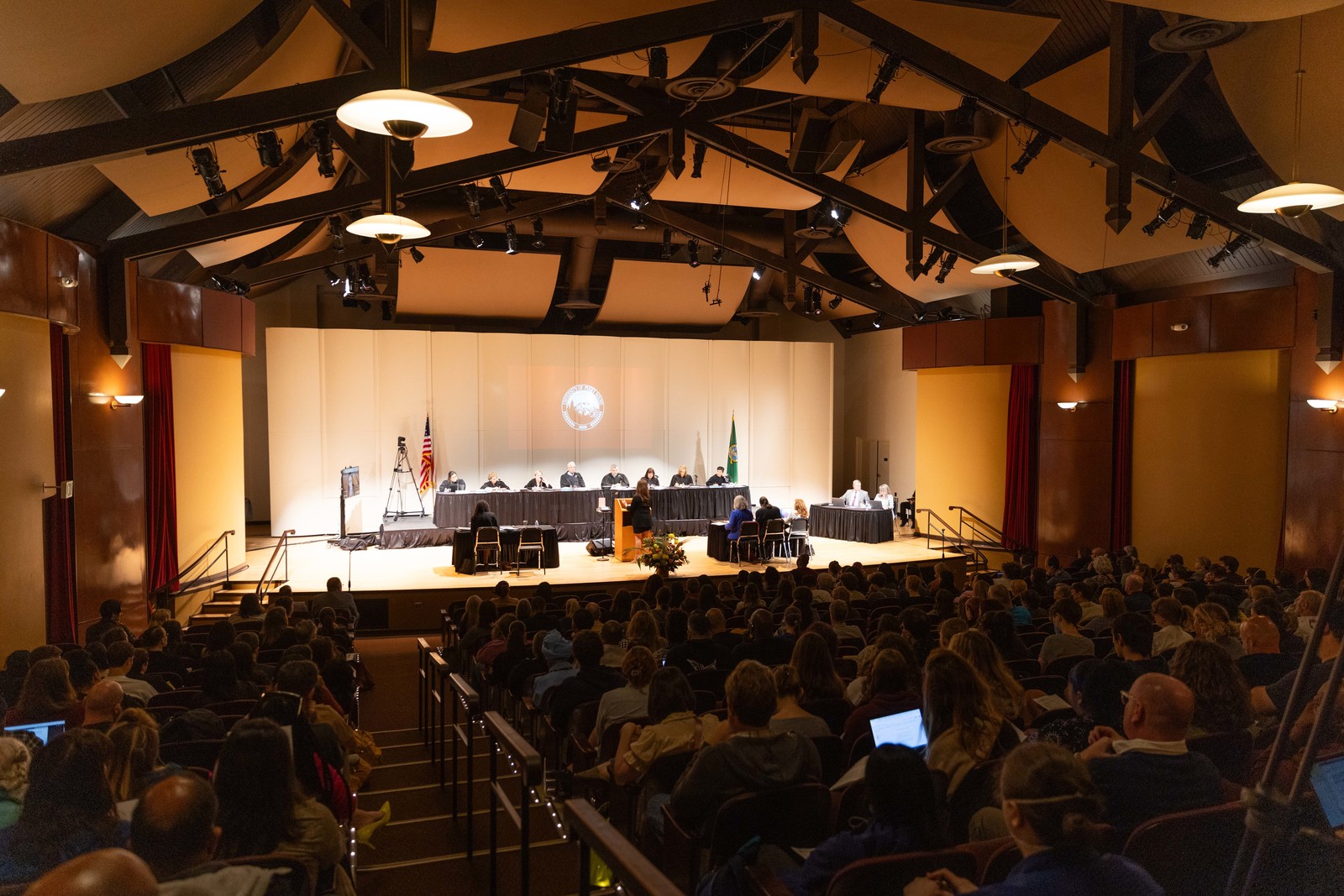Washington Supreme Court Hears Case Involving Former University Student on Campus, Community Rallies in Support

By Albert Chang-Yoo
From September 13-14, the Washington State Supreme Court made a traveling court visit to the University of Puget Sound, marking the court’s first visit in six years. The court heard arguments related to a case involving a former Puget Sound student enrolled through the Freedom Education Project Puget Sound (FEPPS), a University program offering higher education opportunities to incarcerated individuals at Washington State’s main women’s prison.
On September 14, the Justices listened to oral arguments for two cases at a public hearing in Schneebeck Concert Hall. The latter case, State of Washington v. Kimonti Dennis Carter & Shawn Dee Reite, is a criminal case over the authority of the court system to alter life sentences. Attention on campus was drawn to the case following an organized movement to garner backing for the defendants, Kimonti Carter and Shawn Reite. By the time arguments began for Carter and Reite’s case, the auditorium had swelled to max capacity, with most attendees being students and community members who had shown up to support Carter
and Reite. Last year the Washington State Supreme Court invalidated mandatory life sentencing in Restraint of Monschke for 18-21 year olds convicted of murder, arguing that courts must exercise discretion, in part because of incomplete brain development. Both Carter and Reite’s cases were re-examined in court and they were resentenced, essentially freeing them as the new sentences included time served.
The Pierce County Prosecutor appealed Carter and Reite’s resentencing, taking it to the state Supreme Court. During the hearing, prosecutors argued that the courts had no legal authority over the matter, and that the state should consider implementing a life with parole alternative to life without parole sentencing. Many of the Justices appeared skeptical of the argument. The Justices will likely reach a decision within the next 2-3 months, as their fall session ends on December 5. The ruling will likely decide whether or not Carter and Reite will be re-incarcerated. Before Monschke, the only possible sentencing for an 18 year old convicted of murder was life in prison without parole, without consideration of circumstance or individual qualities. Last year’s ruling opened the possibility for a judge to look at such things. “When we got back for that resentencing, a judge took both points of view — all of the evidence, heard from victim’s survivors, heard from the defendant — and imposed sentences that each individual judge felt was a fair sentence, which again, these individuals have served,” Jeffrey Ellis, Carter and Reite’s attorney, said. Earlier in the week on Tuesday, Sept. 12, 40-50 campus members crowded the Tahoma Room for a panel discussion titled “How People Are Thriving and Enacting Change in the Community after Long Prison Sentences,” an event organized by Crime, Law and Justice studies and FEPPS. The event was organized largely to support Carter and Reite’s case.
All panelists were formerly incarcerated individuals who now work directly with community organizing efforts, such as Eugene Youngblood, who spent almost 30 years in prison before becoming a criminal justice advocate for the Freedom House. During an emotional testimony, panelists spoke about the importance of prisoner education and rehabilitation efforts. They also spoke in support of Carter and Reite, both of whom are active community leaders.
After several years of bouncing around the juvenile justice system, when he was 18 years old, Kimonti Carter was sentenced to life without parole for a gang-related charge of aggravated murder. Carter was incarcerated for 25 years before being released last July. During his time in prison, he helped found Taking Education and Creating History (TEACH), a prisoner-led higher education program, and now works as a leader of the Black Prisoners’ Caucus, which advocates against mass incarceration and supports educational and re-entry opportunities
Shawn Reite has spent the majority of her life inside the Washington Corrections Center for Women on charges of aggravated murder. At 20 years old, Reite was sentenced to life without parole and for the next 32 years did not see the outside world. During her time in prison, she joined FEPPS to pursue a higher education degree through the University of Puget Sound. After getting out of prison last November, Reite became a student at Evergreen State College, and has worked as a peer navigator to support students. Jeffrey Ellis, the attorney who represents Carter and Reite, explained how the pair are part of a new wave of activists. “Shawn and Kimonti are part of a now growing community of formerly incarcerated individuals who’ve been released, and who believe that it is their obligation to give back to the community,” he said. Ellis has spent the better part of 30 years as an attorney. He shifted to focusing on juvenile and late adolescent resentencing cases after a “transformative experience” working on the case of Napoleon Beazley, one of the last convicted juveniles to be executed in the U.S.
The heart of the matter is what the true focus of criminal justice should be for those who have committed serious crimes. “The system doesn’t look at growth we had while incarcerated,” James Jackson, head of the Evergreen Prison Reentry Project, said during the Tuesday panel. Around 1.9 million people were incarcerated in the U.S. in 2022. Yet, according to Ellis, about 90% of people who go to prison are eventually released. “And so it’s important to consider what they bring to the community,” Ellis said. “I do this work because of the community that I live in, and the community that I want to live in, and that community includes incarcerated individuals.”
